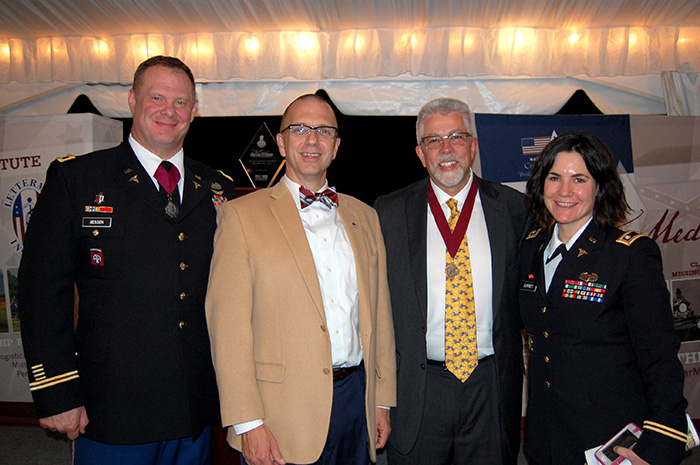Dr. Holcomb Presented with 2016 Medical Excellence Award

A former commander at the U.S. Army Institute of Surgical Research at Fort Sam Houston, Texas, was presented with the 9th Annual Major Jonathan Letterman Medical Excellence Award Oct. 6 during an awards ceremony in Dickerson, Maryland. Retired Army Colonel, Dr. John B. Holcomb, Director of the Center for Translational Injury Research at the University of Texas Medical School in Houston, accepted the award presented by the National Museum of Civil War Medicine.
According to the NMCWM website, "the award honors an individual, program or organization that has made an exemplary contribution to civilian or military medicine - continuing the legacy of Dr. Letterman and is given to those that are leading innovative efforts in battlefield care, prosthetic technology, improving patient outcomes of the severely wounded, or leveraging cutting edge medical technology in new ways."
"This award is a reflection of a team that I had the opportunity to work with at the ISR and the Joint Trauma System," said Holcomb. "It also highlights that we have made significant contributions to combat casualty care, but there's still a lot more work that needs to be done."
Holcomb served 23 years in the Army as a trauma surgeon and is well-known in the combat casualty care research community. While active duty in the Army, he served in Somalia as a trauma surgeon with the Joint Special Operations Command, delivering combat care to soldiers that was the inspiration for the movie Black Hawk Down.
"Somalia changed my life," said Holcomb. "We lost some great Soldiers and I wanted to do what I could to prevent that in the future, that's why I chose a career in combat casualty care."
While Holcomb attributes his time in Somalia to his dedication to combat casualty care, he was also inspired by his Army leaders beginning during his residency at William Beaumont Army Medical Center in El Paso, Texas. That inspiration carried on to his time as a trauma surgeon with Special Operations Forces and on to his time as the commander at the ISR from 2002 to 2006.
"In researching the career of Colonel Holcomb, it became obvious that he is indeed a 'Living Letterman,'" explained National Museum of Civil War Medicine Executive Director David Price in a press release. "The New York Times published a profile of Colonel Holcomb in November of 2007 that chronicled his commitment to improving medical care for wounded warriors. He helped redesign the evacuation system for wounded soldiers, he advocated for the Joint Theater Trauma Registry to help standardize medical care and identify best practices, and he continued to work on new treatments to improve care - just like Major Jonathan Letterman did during the Civil War. There are few more deserving of this award than Colonel Holcomb."
 An official website of the United States government
An official website of the United States government
 ) or https:// means you've safely connected to the .mil website. Share sensitive information only on official, secure websites.
) or https:// means you've safely connected to the .mil website. Share sensitive information only on official, secure websites.


